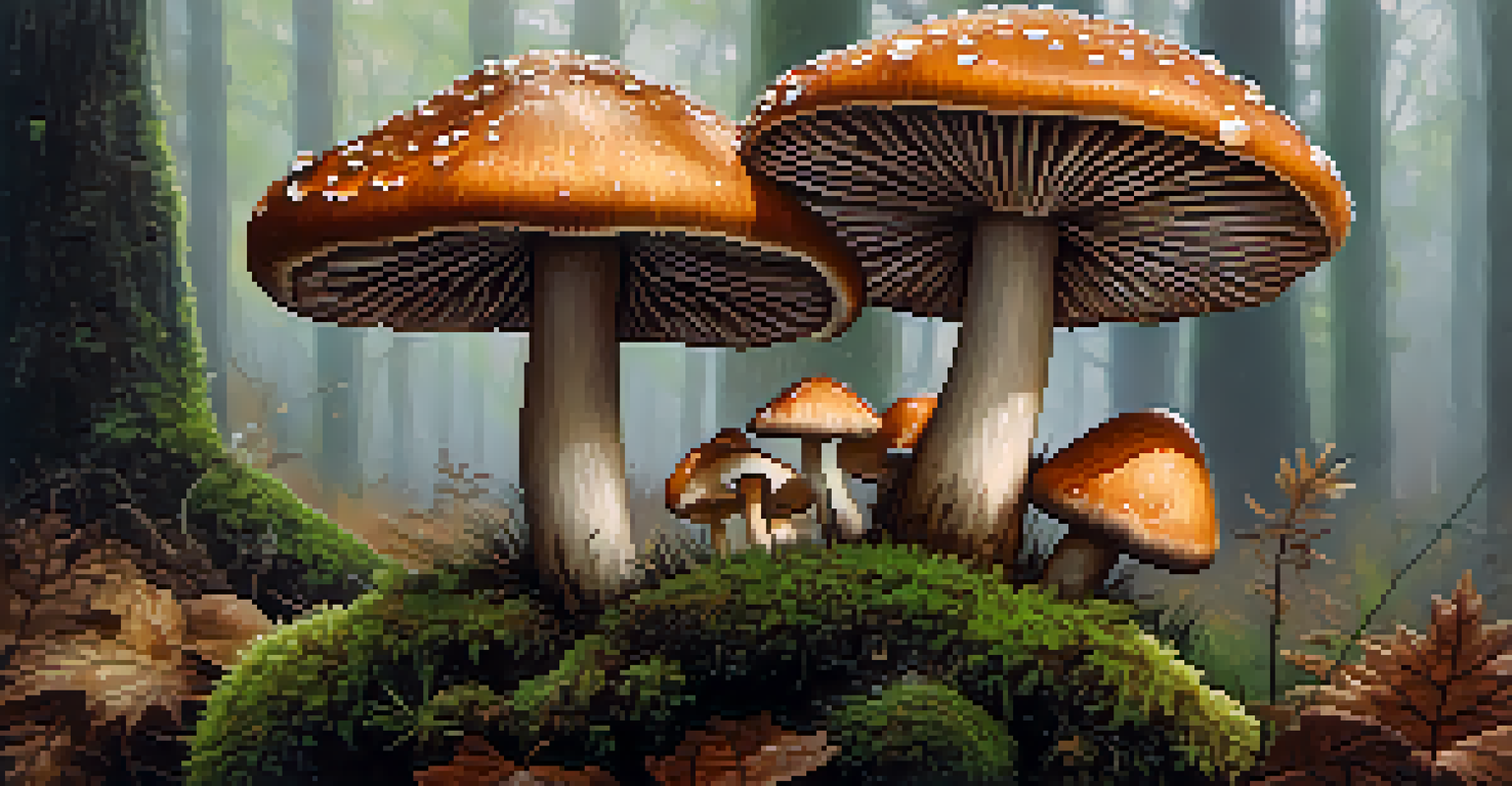Entheogens as Catalysts for Environmental Responsibility

Understanding Entheogens and Their Role
Entheogens are substances that often induce altered states of consciousness, which can facilitate profound spiritual experiences. These natural compounds, including psilocybin mushrooms and ayahuasca, have been used for centuries in various cultures for healing and introspection. Their ability to expand perception can lead to a greater understanding of oneself and the world around us.
Nature does not hurry, yet everything is accomplished.
When individuals engage with entheogens, they often report feelings of interconnectedness with nature. This heightened awareness can foster a sense of responsibility toward the environment, as users begin to see their place within the ecosystem. This realization can be empowering, prompting individuals to take action to protect the planet.
Moreover, the therapeutic applications of entheogens are becoming increasingly recognized, particularly in addressing mental health issues. As people heal and grow through these experiences, they may also cultivate a deeper appreciation for the natural world, paving the way for a more sustainable lifestyle.
The Connection Between Nature and Psychedelic Experiences
Many users of entheogens describe their experiences as deeply connected to nature. This connection often evokes a profound sense of awe and reverence for the environment. Such experiences can lead to a transformation in how individuals perceive their relationship with the earth and its ecosystems.

For example, during a psychedelic trip, someone might encounter vivid imagery of forests, oceans, or wildlife, reinforcing the beauty and fragility of these natural environments. This emotional engagement can enhance the urgency for environmental advocacy and conservation efforts. It’s as if these substances unlock a deeper appreciation for the planet's wonders.
Entheogens Foster Environmental Awareness
Engaging with entheogens often leads to a heightened sense of interconnectedness with nature and a commitment to environmental stewardship.
Furthermore, the narratives shared by those who have journeyed with entheogens often highlight themes of unity and stewardship. By fostering a sense of responsibility, these experiences can translate into tangible actions, such as participating in environmental clean-ups or advocating for sustainable practices.
Cultural Perspectives on Entheogens and Nature
Various indigenous cultures have long recognized the significance of entheogens as a means to connect with the spirit of nature. For them, these substances are not merely tools for recreation; they are sacred gifts that foster a profound relationship with the earth. This cultural wisdom underscores the importance of respecting and protecting the natural world.
The greatest threat to our planet is the belief that someone else will save it.
Incorporating traditional practices, such as guided ceremonies, allows participants to engage with entheogens in a respectful manner, emphasizing their role as teachers rather than mere substances. This reverence can instill a sense of duty to honor the environment, promoting sustainable living practices that are harmonious with nature.
Moreover, by sharing these cultural narratives, we can learn valuable lessons about our responsibilities toward the earth. This understanding can be a catalyst for a broader movement that encourages people to embrace eco-consciousness as part of their personal and communal journeys.
Entheogens and the Rise of Eco-Conscious Movements
In recent years, there has been a noticeable rise in eco-conscious movements that draw inspiration from entheogenic experiences. Activists and organizations are increasingly recognizing the potential of these substances to awaken environmental awareness. This trend is reflected in various initiatives aimed at promoting sustainability and conservation.
For instance, workshops and retreats that combine entheogenic experiences with environmental education are becoming more popular. Participants not only explore their inner landscapes but also engage in discussions on climate change, biodiversity, and ecological stewardship. This fusion creates a unique platform for fostering a sense of community and collective responsibility.
Cultural Wisdom Guides Responsible Use
Indigenous cultures emphasize the sacred role of entheogens, encouraging respectful practices that promote sustainability and environmental respect.
As more people share their stories of transformation, the connection between entheogens and environmental advocacy continues to grow. This collective movement can inspire greater action and awareness, encouraging individuals to become champions for the planet.
Personal Transformation Through Entheogenic Experiences
Personal transformation is a common theme among those who have engaged with entheogens. Many report shifts in perspective that lead to more environmentally friendly lifestyles. This transformation often includes adopting sustainable practices, such as reducing waste and supporting eco-friendly products.
For example, someone who previously showed little interest in environmental issues may find themselves inspired to volunteer for conservation efforts after an entheogenic experience. This newfound passion can create a ripple effect, influencing friends and family to also consider their environmental impact. It’s a reminder of how interconnected we all are.
Additionally, the introspective nature of these experiences can help individuals confront their values and priorities. This process often leads to a reevaluation of lifestyle choices, prompting a commitment to living in harmony with the planet rather than at its expense.
Challenges and Ethical Considerations
While the potential benefits of entheogens are promising, there are also challenges and ethical considerations to address. One concern is the commercialization of entheogenic experiences, which can lead to a superficial understanding of their significance. It’s crucial to approach these substances with respect and intention, rather than as just another trend.
Furthermore, there is the issue of accessibility and cultural appropriation. As entheogens become more mainstream, it’s essential to honor their roots and the cultures that have traditionally used them. This means ensuring that indigenous voices are heard and respected in discussions surrounding entheogenic practices.
Personal Transformation Inspires Action
Many individuals experience profound personal transformations through entheogens, motivating them to adopt environmentally friendly lifestyles.
Navigating these challenges requires a collective effort to promote responsible use and to educate others about the importance of ethical considerations. By fostering a deeper understanding, we can ensure that the exploration of entheogens leads to genuine environmental stewardship rather than mere novelty.
The Future of Entheogens and Environmental Responsibility
Looking ahead, the relationship between entheogens and environmental responsibility is likely to evolve. As more research emerges highlighting the benefits of these substances, their role in promoting ecological awareness may gain broader recognition. This could pave the way for policy changes that support responsible use and research into entheogens.
Moreover, grassroots movements that incorporate entheogenic experiences into environmental advocacy are likely to flourish. These initiatives can inspire a new generation of eco-warriors who are deeply connected to the planet. By fostering a culture of respect and stewardship, we can create lasting change.

Ultimately, the journey toward environmental responsibility through entheogens is just beginning. By embracing this potential, we can cultivate a more harmonious relationship with nature, ensuring a healthier planet for future generations.